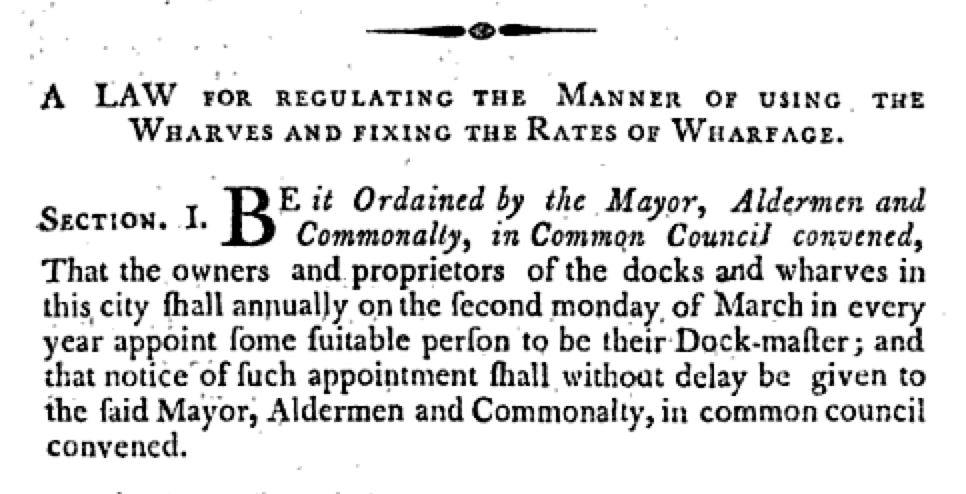 Again mining the laws of Albany from 1800. Are they interesting, or is Hoxsie just overwhelmed with other work? Doesn’t matter: here we go, with the law for regulating the manner of using the wharves and fixing the rates of wharfage.
Again mining the laws of Albany from 1800. Are they interesting, or is Hoxsie just overwhelmed with other work? Doesn’t matter: here we go, with the law for regulating the manner of using the wharves and fixing the rates of wharfage.
Each year, specifically on the second Monday of March, the owners and proprietors of the docks and wharves in Albany were to appoint “some suitable person to be their Dock-master.” It was the job of the dock-master to collect fees from “any vessel, craft, boat or flat, (canoes, two handed batteauxs and three handed batteauxs excepted) which shall come to lie at or within any of the said docks, wharves or slips…” Such fees could be paid by the season or by the day. The seasonal rate was $1.06 for every vessel five tons and under, and 20 additional cents for every ton of “burthen” thereafter. The daily rate was two cents per ton per day for any boat 20 tons or under. Boats between 20 and 40 tons were charged a cent and a half per ton per day. Boats above 40 tons got the discounted rate of one cent and a quarter per ton per day.
No vessel, craft, boat or flat was to lie within the dock, wharf or slip “longer than shall be necessary for the convenient lading or unlading the same.” If your vessel, etc., prevented any other vessel from coming in or going out, you were obliged to pay for every tide that such other vessel was prevented from coming or going, at $2.50 per tide.
Cast or deposit on any of the docks, wharves or slips any ballast, lumber, stone, filth, dirt, or any other thing, and not remove it within the required time, and you would forfeit the sum of $1.25.
You couldn’t just avoid the wharfage fees by anchoring in the river either, though you could get a discount. Any vessel lying at anchor in Hudson’s river “from or to which vessel, craft, boat or flat, any goods or merchandize shall be landed or embarked, on or from any such dock, wharf or slip, shall be liable to pay half the rate of wharfage for every day in which such dock, wharf or slip shall be used for the purpose aforesaid.” Perhaps that was just a way to deal with overcrowded docks.
By the way, “wharfage” is totally a word.
